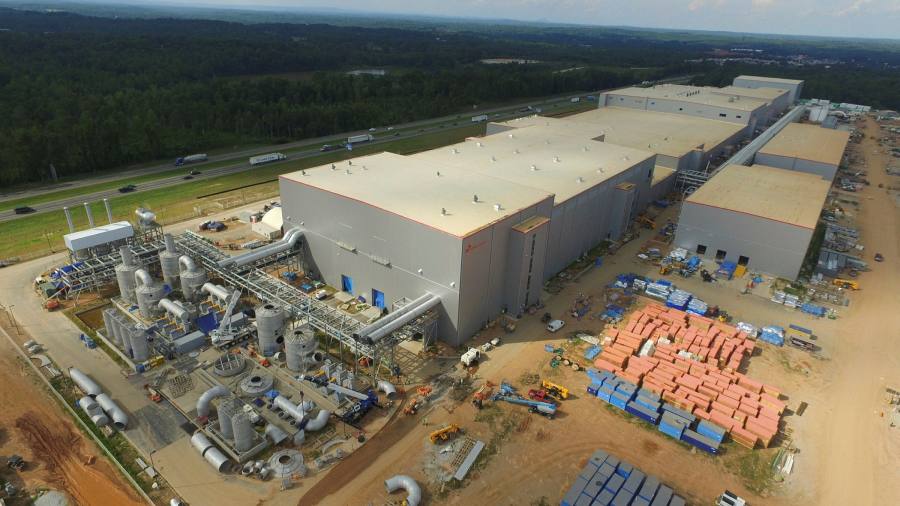[ad_1]
US president Joe Biden has been handed a poison chalice. Barely a month into the job, he has to decide between saving a Georgia battery factory that promises to provide 2,600 jobs and clean power for 330,000 cars a year, or defending a foreign company to protect the principle that intellectual property rights are inviolable.
The US International Trade Commission last week ruled in favour of South Korean conglomerate LG Chem in its battle with rival SK Innovation over alleged misappropriation of trade secrets concerning electric vehicle batteries. It banned SKI from importing components to make EV batteries in the US using the contested technology for the next decade. The decision was based on evidence that SKI deliberately destroyed thousands of documents that might have helped LG prove its case.
The ITC is an independent agency charged with defending US industry against unfair trade practices, such as trade secret misappropriation. But it must also consider the impact of its rulings on American industry and jobs; in this case, on carmakers Ford and VW Group of America, which were relying on SKI to provide batteries for their new electric models.Â
The ITC solution was to impose the full 10-year ban requested by LG Chem on SKI. But at the same time it granted a grace period allowing SKI to supply Ford for four years and VW for two years. This gives both carmakers time to find new suppliers and have the batteries they need for their new electric vehicles.
The problem now is that the dispute moves out of the legal arena and into politics. President Biden has 60 days to override the ruling, if he judges this is in the national interest. A presidential override of an ITC judgment is rare but not unprecedented. Former president Barack Obama did just that in a dispute between Apple and Samsung in 2013.
Over the next two months SKI, carmakers, lawmakers and Georgia officials will be lobbying the White House to do the same for SKI.Â
They will focus on the Biden administration’s promise to accelerate electric vehicle adoption in the US as part of its green agenda. SKI’s $2.6bn factory is the biggest investment in Georgia’s history. Furthermore, with 22GW of annual capacity scheduled by the end of 2022, it was set to give a meaningful boost to US battery production. The political pressure in the coming weeks will be intense.
Yet the grounds for overturning the ITC’s ruling are flimsy. SKI’s investment in Georgia is hardly likely to go to waste. The shortage of EV battery production in the US makes the facility highly attractive to others, should SKI decide the remedies are too severe to continue.Â
State officials may call publicly for the ruling to be reversed. But some say privately they are confident of finding new investors for the facility if necessary. They also point out that those 2,600 jobs have not yet been created — barely 300 so far, according to local reports. So it is not as if thousands of people will be out of work.
Moreover, Ford has said it believes the ruling allows it to launch the electric version of its iconic F-150 truck on time. If the company — which lobbied for SKI during the ITC investigation — did not begin seeking alternative suppliers a year ago when damning preliminary findings were handed down, its risk managers have not done their job.
SKI admits to destroying documents but says that preservation is not a legal requirement in South Korea ahead of a lawsuit. It also argues that the allegations of misappropriation of trade secrets were never tested in court.
But this is semantics. The discovery process during the ITC investigation revealed clear efforts to eliminate documents with sensitive information acquired through the poaching of dozens of LG employees. The preliminary judgment said this was done “with a culpable state of mind and to impair the ability of LG Chem to prove SKI possessed its informationâ€. The final ruling supports these findings.
It would be wrong for many reasons to overturn the ITC’s ruling, which is a clever compromise between US interests and principle. SKI and LG can still come to an arrangement which would be in both their interests — given that a civil suit in Delaware is still ongoing — and in the wider interests of President Biden’s green agenda.Â
But the most important reason must be that the US has long made the respect of intellectual property rights a key plank of trade policy, particularly with regard to China. If US companies such as Ford are encouraged to shrug off the wrongdoing highlighted by the ITC, what would that mean when they next cry foul abroad?Â
peggy.hollinger@ft.com
[ad_2]
Source link






